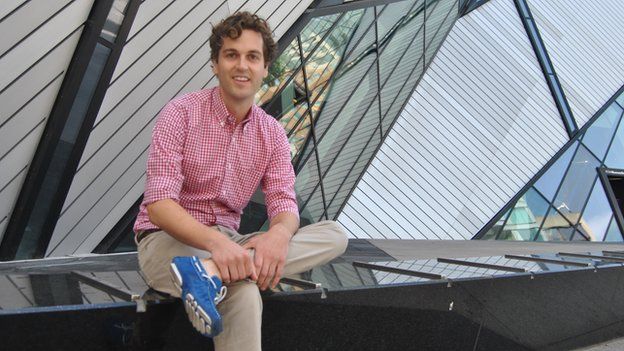Picking the best location for your business
- Published

Choosing where to locate a new business can be a difficult decision for any entrepreneur.
Do you simply stick to the familiar surroundings of your hometown, where you have your family for support?
Or do you need to move to a big city to find a larger customer base, or to be part of a network of similar businesses?
This choice can be a dilemma in any country, but it is even more difficult in a nation the size of Canada, the world's second largest.
For while the internet has made it far easier for firms - especially digital ones - to be based wherever they want, it still often remains the case that location is vital, be it to be close to customers, suppliers, competitors, or available staff.
Take the imaginary example of a software developer thinking of setting up shop in Nunavut, Canada's northern-most territory, so the boss can enjoy the majestic Arctic surroundings. The company may struggle to find enough qualified workers.
More than 2,000km (1,242 miles) south of Nunavut, in Toronto, Canada's largest city, some very real businessmen and women explain how and why they chose where to base themselves.
Bitcoin business
For Mitchell Callahan, a 29-year-old technology entrepreneur from Calgary, Alberta, his decision to relocate to Toronto earlier this year was both professional and personal.
Firstly, his girlfriend was moving to Toronto to go to business school, and secondly he recognised that it was a much larger and more lucrative marketplace for the website and app design business he had co-founded.
The company, Saucal, specialises in software that allows online retailers to accept bitcoin, an online currency.
Mr Callahan and his business partner Dominik Sauter set up the firm in 2011, drawing from the experience and knowledge that Mr Callahan gained from his previous job working for an investment firm.
"We started out small, we started building shopping cart plugins [for websites], so people could accept bitcoin. Then it scaled up from there," says Mr Callahan.
He adds that as the Bitcoin market is far more established in Toronto than Calgary, his move has enabled him to expand the business far more quickly.
And while Mr Sauter and other Saucal colleagues remain back in Alberta, Mr Callahan says he has no plans to return.
Escaping Toronto
In marked contrast to Mitchell Callahan - Lisa and Ryan Stewart decided to leave Toronto to get their home cleaning business Posh off the ground.
The couple used to live in Toronto, but felt that the big city's heavy traffic would make it too difficult for them and their workforce, now 15-strong, to go from house to house.
And so they moved 70km from Toronto to the much smaller city of Hamilton, which had the added benefit of being where Mr Stewart, 38, was born and brought up.
The couple now have two young children, and say that having access to family babysitters helps them with their day-to-day work and life flexibility.
Their business is now three years old, has 160 customers, and is continuing to grow strongly, thanks mainly to positive word of mouth.
Plans are afoot to expand outside of Hamilton - but not to Toronto.
Tasty insects?
For chef and business owner Natalia Martinez, she decided to base herself in Toronto because she says multicultural Torontonians are so open to trying new foods.
"There are so many variations of food [in the city] that Torontonians want to try something new," says the 33 year old.
Seeing that some of Ms Martinez's dishes are made from insects, you can understand why she is keen on having an open-minded customer base.
The insects she serves are crickets, the relative of the grasshopper. She sells them covered in chocolate, baked in sugar, and even stuffed in tomatoes.
Her company, Cookie Martinez, has now been in business since 2012, and also sells a range of insect-free products, such as biscuits and Latin American pasties called empanadas.
Ms Martinez, who moved to Canada from her native Colombia in 2003, says she also benefits from the networking opportunities available in Toronto's vast and thriving restaurant scene.
"I wanted to be my own boss, even though I knew it was going to be hard," she says. "I like it, I love cooking and making people happy, and making food for my customers and friends."
Joining ecosystems
Prof Rebecca Reuber, from the University of Toronto's Rotman School of Management, says new entrepreneurs should consider locating themselves in existing clusters or networks.
"If I was going to start a video games business, or one in animation, maybe I'd look to Montreal and Vancouver," she says.
"If I was developing technology for marine applications I might be in [the coastal cities of] St John's, Halifax or Vancouver."
She adds that in such places there are accountants, lawyers and available staff that all understand the sector in question.
"It's just having that ecosystem of organisations that gets that sector, that's what's so important about it," says Prof Reuber.
"It depends how experienced you are as an entrepreneur. If you are learning, it's good to have a lot of people to learn from around you."